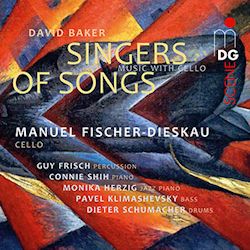Singers of Songs/Weavers of Dreams, for cello and percussion [18:59] ¹
Cello Sonata (1973-77) [19:23] ²
Suite for Cello and Jazz Trio (1994) [17:05] ³
Manuel Fischer-Dieskau (cello)
Guy Frisch (percussion) ¹
Connie Shih (piano) ²
Jazz Trio: Monika Herzig (piano): Pavel Klimashevsky (bass): Dieter Schumacher (drums) ³
rec. February-June, 2013, Konzerthaus der Abtei Marienmünster
[55:50]
The American Third Stream composer David Baker is well-known as an erstwhile Bebop trombonist, and continuing educator in the jazz world. In fact, he
writes across the genres, with a vast oeuvre to his name, exceeding 2,000 compositions, a number that makes Darius Milhaud seem positively lazy. There are
symphonies – I don’t know how many, though presumably not yet as many as Miaskovsky or Havergal Brian – ballets, film scores and many jazz arrangements.
He’s written for the Beaux Arts Trio, and for eminent string players including Joseph Gingold and Janos Starker.
This disc concentrates on his works for cello and allied forces. Singers of Songs/Weavers of Dreams is written for cello and 17 percussion
instruments, though all played by the same player I should add, and is cast in five movements. Four of the movements pay homage – direct or oblique – to a
named jazz musician; Miles Davis, Sonny Rollins, Duke Ellington and Dizzy Gillespie. The third movement is named for Paul Robeson. Sonic colour rather than
development per se is the uppermost element here. The movement for Miles Davis is quite introspectively tangential with shimmering chimes, whereas
the percussive statements are far more overt where Sonny Rollins is concerned, a Calypso appropriately making itself heard via the sinuous cello lines.
Dissonant cello writing and a strong percussion tattoo announce Robeson – a more militant than emollient presence at least to begin with, before Spirituals
emerge (Go Down Moses, Motherless Child) where lyricism is at its most acute in this work. Duke is abstract – I found this the least impressive
movement as Baker seems unable to find a language to convey much of interest – but Dizzy Gillespie, because more extrovert, is better, an exciting romp for
cello over drum tattoos and Latino vibe, complete with brief percussion solo.
The Cello Sonata was written over several years for the exacting Janos Starker, who duly premiered and recorded it. The movements are marked, with
disarming simplicity and lack of pretension, ‘Fast – Slow - Fast’. It’s an attractive lyrical work, energetic but also, in the slow movement, capable of
melancholic introspection. This is a quality that recurs where the keening pizzicatos distil possible Bachian elements. The finale is a speedy affair, but
flexibly so, with occasional Boogie-like piano patterns. The end is fractious and dramatic. Finally there is the Suite for Cello and Jazz Trio, composed in
1994. Here is Baker at his most unbuttoned. Things are more generously proportioned, if less academic. Thus there’s a strut to the opening of the four
movements, and a gentle ballad and romantic reverie in the second. The sassy Blues in the third section includes one or two naughty quotations. A point to
note: the soloists in this recording elected to add solos for the jazz trio, of which Baker approves. Finally there’s a Calypso finale – hints of the
Gillespie movement in the earlier work – which ends the Suite very genially. Baker is too practised a musician to allow this work to turn into an
incongruous mismatch between the classically-leaning cello and the jazz trio. Things mesh well.
Third Stream or what you will, the performers, led by Manuel Fischer-Dieskau, sound fully in the groove. There’s no stiffness or stylistic buffer zone.
With a finely detailed SACD recording to match, this is one that Baker admirers can happily enjoy.
Jonathan Woolf
